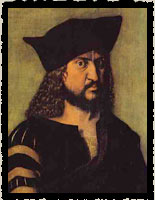
Frederick the Wise is remembered as the man who saved Martin Luther from the fury of the Catholic Church.
Most likely you have never heard the name Frederick the Wise. Yet this man was most responsible for the Reformation movement. Not Luther, not Calvin, not Zwingli but Frederick the Wise.
Frederick the Wise commanded the largest army in Europe and was angry because he had not been made Pope. A dangerous combination. In Saxony (one of sixteen states in Germany) where Frederick ruled, there was a beer drinking Germany monk who taught theology at the University of Wittenberg. While Luther’s writings were reprehensible to the Roman Catholic Church Frederick took a liking to Luther and protected him.
Frederick the Wise said, “Let this man say what he has to say, nobody’s to touch him.” And no one had an army big enough to challenge Frederick the Wise.
The key to the Reformation wasn’t so much a spiritual revival as it was the military might of Frederick the Wise.
The state of Saxony removed Catholicism as the official state religion. To fill this vacuum Luther was given free rein to establish a new state religion.
Luther was left with a nation of empty church buildings. He sent out his followers to take over the buildings and began promulgating his teachings.
Over time Catholic priests began leaving the Catholic Church, they read Luther’s writings, married, and joined the Reformation. Luther produced an ecclesiastical structure, a hymn book, and a Protestant Bible which he translated, published and distributed. These former priests began serving as Protestant ministers to the churches throughout the Saxony region.
Up until this time there was no “
pastoral role” known in the Protestant world.
The
pastor distinction began in Wittenberg, Germany.
So did the following:
1) High up on one of the pillars of the church was a pulpit which the Catholic priest climbed up to by means of a circular staircase to read the weekly announcements to the assembly. Luther took that idea and ripped out the altar replacing it with a pulpit front and center in its place. The birth of the pulpit.
2) Luther preached every Sunday morning at the same time Catholic mass had been scheduled. Because Luther enjoyed staying up late to go to the tavern, talk and drink beer getting up early on Sunday was difficult. So worship began at the saner hour of 9:00 AM. But the older he got, the longer he talked and the more he drank. This forced him to move the morning gathering to 11:00 AM. The birth of the Sunday morning 11:00 AM worship.










